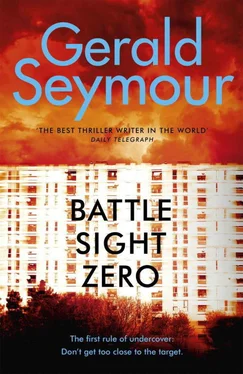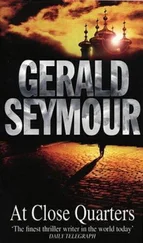Carrying the rifle, the boy who had messed with it – now likely to be trussed and in a bunker below a block – was gone from Karym’s mind.
It was the freedom weapon. It was the rifle chosen by men and women who believed in seductive wars of liberation, and it was easily available to them. A child of ten could learn to strip and assemble, could kill with it… not Karym, who had the liability of his weakened arm. And had never fired one. They had made, he’d read, one hundred million of them, and he had never fired one, aimed down the V sight and the needle set at Battle Sight Zero, not one of the one hundred million – was worse, far more pain to him than the absence of a girl in his life. His brother waiting for him in the shadows, saw him, emerged.
Kids watched. He thought them the pilot fish that swam close to a shark. If the shark fed, ripped at the flesh of a seal or a swimmer then there was debris in the water, meat or gristle, which they’d scavenge… but they’d swim where the power was. If his brother fell then the kids would desert him, as they had deserted the boy taken from his mother. His brother took the weapon.
And was gone. Nothing shared. He was not an actor, only a witness – not a player but part of the audience. He did not complain. He had no affection for his brother, and none was shown him, but each was of use to the other. Karym’s brother was a protector, and Karym was a useful courier, errand runner.
Karym took his place again, among the other watchers at the entrance to the project. He sensed a growing anticipation around him because a barbecue was planned, but he did not know when, nor where. When questions were asked of him, he merely shrugged, would not admit ignorance. But the mood was there, around him, like jungle creatures sniffing blood, and the first customers were coming to the checkpoint and would be escorted by boys to the payment and distribution points. Blood, to the boys of the La Castellane project, had a clear and distinctive scent.
The binoculars were passed between them, backwards and forwards.
‘What do you read?’
‘Read something, cannot say.’
Major Valery held the binoculars, high-powered but with a fine cloth mesh over the lenses so that reflection from street-lights did not flash back off them. He wore black overalls, a black balaclava hid his face, and the belt and pistol holster at his waist were black. It was a place he came to once a week or once a fortnight, and it had been found by his companion. There were few evenings when the Major was home, off the Rue d’Orient, near to the hospitals and the city cemetery, and far from the 15th arrondissement , when the offices at L’Évêché emptied. The district of Verduron, the project of La Castellane, was at the heart of his responsibility, but he had many, was worked to the bone. He had come from the northern city of Lille, civilisation, had been transferred to Marseille with promises of fast-track promotion after the corruption scandal involving the Brigade anti-criminalité . A section of investigators and their infrastructure had been proven to be on the take, doing it big time, for tens of thousands of euros. He trusted few whom he worked with, but one man in particular was marked out, in the Major’s mind, as having uncompromising, granite-hard integrity. They hunted together, were often a pair. He thought his companion could not be bought, therefore had the greatest value, and was a proven killer. He passed the binoculars to the sergeant, to the one they called Samson. A grim name, perhaps appropriate, and neither wanted nor disowned. It was their habit to come to a vantage-point above any of the projects, where a decent view was possible, where a secure hiding place was available.
‘Difficult to assess, but a tension.’
‘Unusual, more kids hanging on corners, and older people safe in their buildings.’
‘A priest spoke of a mother’s visit to him, came to him because she believed he would have greater influence than an imam. A boy in trouble, a dealer, whatever – we can do nothing. It is a tough place, toughest for those who have to live there.’
‘There is an atmosphere, something builds,’ Samson murmured.
It was not necessary for them to be there, beyond the duty call, and neither would have shared the results of their surveillance with others, gave no confidences. The Major was known to have been brought to Marseille to restore a degree of integrity in the Brigade, and the Sergeant’s identity had been leaked and he, his blue balaclava, his given name and the marksman’s rifle, had become known.
‘I had a call – not your concern but I took a call. Very grand, the Metropolitan Police from England, Scotland Yard, a voice that seemed to regard me as a hotel concierge , and they have an Undercover coming through: no detail, no explanation, just the suggestion that I make a backup team available. Not through the usual channels, but direct and circumventing them to save time. I come here, look at that place, at La Castellane, at the customers coming for purchase of hashish, all criminal and illegal, and I relax… I could have broken the phone, Samson, indeed I could.’
‘You told them to go fuck…’
‘Sort it when they come, time then… Samson, what do you see?’
The marksman said that his own quiet time in an evening, while his wife cooked or made clothes, or ironed her uniform for the next day’s inner city policing, was to watch the nature films on the TV. He spoke of hyenas in an African reserve, gathering because a big predator was closing in on a kill, and if the hyenas were alerted then so also would the vultures. They could smell, the hyenas could, Samson said, when a death was imminent, and the vultures watched through every hour of daylight. He thought it was like that, a world of hyenas and vultures and the near-dead, in the project.
A mirthless chuckle from the Major. ‘And the kids there are the hyenas, or the vultures?’
Samson said softly, ‘Nearly, not quite. The kids enjoy the spectacle of the killing. The hyena kills to eat or to clear the scraps left… it is a small difference.’
They would give it another half an hour then leave as quietly and as unseen as they had come, and they would go to their homes across the city, far from here, from the scent of blood. More customers came and business was brisk that evening.
And another difference, the hyenas in there, among the blocks and patrolling the walkways and entrances, were better armed than the men and women of the GIPN, had greater fire-power… not a place to go short-handed, without good reason.
October 1970
An open sewer ran past the entrance to the building. Old sacking, still marked with the stencilled initials of UNHCR, hung from nails hammered into the beam that crossed the entrance. It rained on the camp; the good weather of the early autumn had gone. Low cloud covered the hills to the east, towards the Syrian border. The building was home to a family that had once owned a villa and an apple orchard and olive groves near to the town of Acre: but Acre was now inside Israeli territory and this was a family that had fled, wisely or unwisely, 22 years earlier. The family was extended – grandparents, parents, and children. And instead of the fine villa and sweet shaded gardens and a smallholding, they lived in a construction put together with a hammer and a liberal supply of nails.
The shot was fired.
The roof was made from rusted corrugated iron sections, as if they had been found on a rubbish heap and brought specially to this camp for Palestinian refugees. The walls were plywood and nailed to the frames of pallets. Two windows were covered with clear cellophane which was stained, darkened and hard to see through. The roof leaked when it rained, the walls gave no protection against the cold of winter, and in that part of Lebanon there would be snow. The mud in front of the entrance was slippery and clinging. The family possessed little except their memories and stories of the past, and the cooking pots that the women used when the camp authorities issued food supplies. There was no work, they had no income, were dependent on subsistence aid. A gift had come their way a month before, but it did not help to heat or feed the family. The eldest grandson had been accepted into the fedayeen group that ran the camp. He was fifteen, conceited, proud that he had been given an AK-47 assault rifle as a mark of his acceptance into the training cadre. Many men in the camp carried weapons. But that day the grandson had left the weapon behind when he had gone for cigarettes.
Читать дальше












